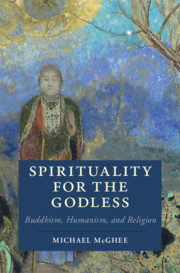Book contents
- Spirituality for the Godless
- Cambridge Studies in Religion, Philosophy, and Society
- Spirituality for the Godless
- Copyright page
- Dedication
- Epigraph
- Contents
- Acknowledgements
- A Shakespearean Prologue
- Introduction
- 1 ‘A Spiritually Enlightened Individual’
- 2 ‘The Resources of a Much Earlier Phase of the Tradition’
- 3 The Distractions of Baruch Spinoza
- 4 Immanuel Kant: ‘To Regard as Petty What We Are Otherwise Anxious About’
- 5 Wittgenstein’s Cool Temple
- 6 Rilke, Shakespeare … and a Little Freud
- 7 Concealment and Revelation
- 8 Mindfulness and the Form of a Philosophical Life
- 9 Epictetus: ‘The Beginning of Philosophy …’
- 10 Ted Hughes: Evaporation, Translation, Translocation
- 11 Philosophy as an Inventive Convergence of Methods
- 12 Richard Norman: ‘The Truths It Contains Are Human Truths’
- 13 Perspectives: Marmalade Stains on the Breakfast Table
- 14 David Hume: Wanting the Natural Sentiments of Humanity
- 15 ‘What is the Difference between Love and God’s Love?’
- 16 ‘Peace, Wild Wooddove, Shy Wings Shut’
- 17 ‘Only a Little Snivelling Half-Wit Can Maintain That’
- 18 ‘The World Is Too Much with Us’
- 19 Of Self and SELF, of Ātman and Anātman
- 20 ‘I Am Myself Alone’
- 21 The Five Heaps or Skandhas
- 22 ‘We Claim That There Is a Person, but We Do Not Say That He Is an Entity’
- 23 Birds, Frogs, and Tintern Abbey
- 24 Human Resources and Hubris
- References
- Index
18 - ‘The World Is Too Much with Us’
Published online by Cambridge University Press: 18 June 2021
- Spirituality for the Godless
- Cambridge Studies in Religion, Philosophy, and Society
- Spirituality for the Godless
- Copyright page
- Dedication
- Epigraph
- Contents
- Acknowledgements
- A Shakespearean Prologue
- Introduction
- 1 ‘A Spiritually Enlightened Individual’
- 2 ‘The Resources of a Much Earlier Phase of the Tradition’
- 3 The Distractions of Baruch Spinoza
- 4 Immanuel Kant: ‘To Regard as Petty What We Are Otherwise Anxious About’
- 5 Wittgenstein’s Cool Temple
- 6 Rilke, Shakespeare … and a Little Freud
- 7 Concealment and Revelation
- 8 Mindfulness and the Form of a Philosophical Life
- 9 Epictetus: ‘The Beginning of Philosophy …’
- 10 Ted Hughes: Evaporation, Translation, Translocation
- 11 Philosophy as an Inventive Convergence of Methods
- 12 Richard Norman: ‘The Truths It Contains Are Human Truths’
- 13 Perspectives: Marmalade Stains on the Breakfast Table
- 14 David Hume: Wanting the Natural Sentiments of Humanity
- 15 ‘What is the Difference between Love and God’s Love?’
- 16 ‘Peace, Wild Wooddove, Shy Wings Shut’
- 17 ‘Only a Little Snivelling Half-Wit Can Maintain That’
- 18 ‘The World Is Too Much with Us’
- 19 Of Self and SELF, of Ātman and Anātman
- 20 ‘I Am Myself Alone’
- 21 The Five Heaps or Skandhas
- 22 ‘We Claim That There Is a Person, but We Do Not Say That He Is an Entity’
- 23 Birds, Frogs, and Tintern Abbey
- 24 Human Resources and Hubris
- References
- Index
Summary
The non-theistic traditions are not entirely unconsidered. Thus, John Cottingham has written that ‘spirituality without religion’ and ‘nontheistic meditative forms of spirituality such as Buddhism and other Eastern traditions … seem to have an essentially quietist character that cannot adequately account for the felt moral demands of our deepest spiritual experiences’. We need, he says, something beyond experience. ‘When we unpack exactly what is involved in the activities and experiences we call spiritual, it is not easy to make fully adequate sense of spirituality, and of its importance for human life, without something close to a theistic framework’. Buddhism has sometimes tended towards quietism, though such notions as prabhasvara-citta or luminous mind and the five indriyas as an integrated orientation towards ethical action hardly fit that assessment.
- Type
- Chapter
- Information
- Spirituality for the GodlessBuddhism, Humanism, and Religion, pp. 134 - 136Publisher: Cambridge University PressPrint publication year: 2021

